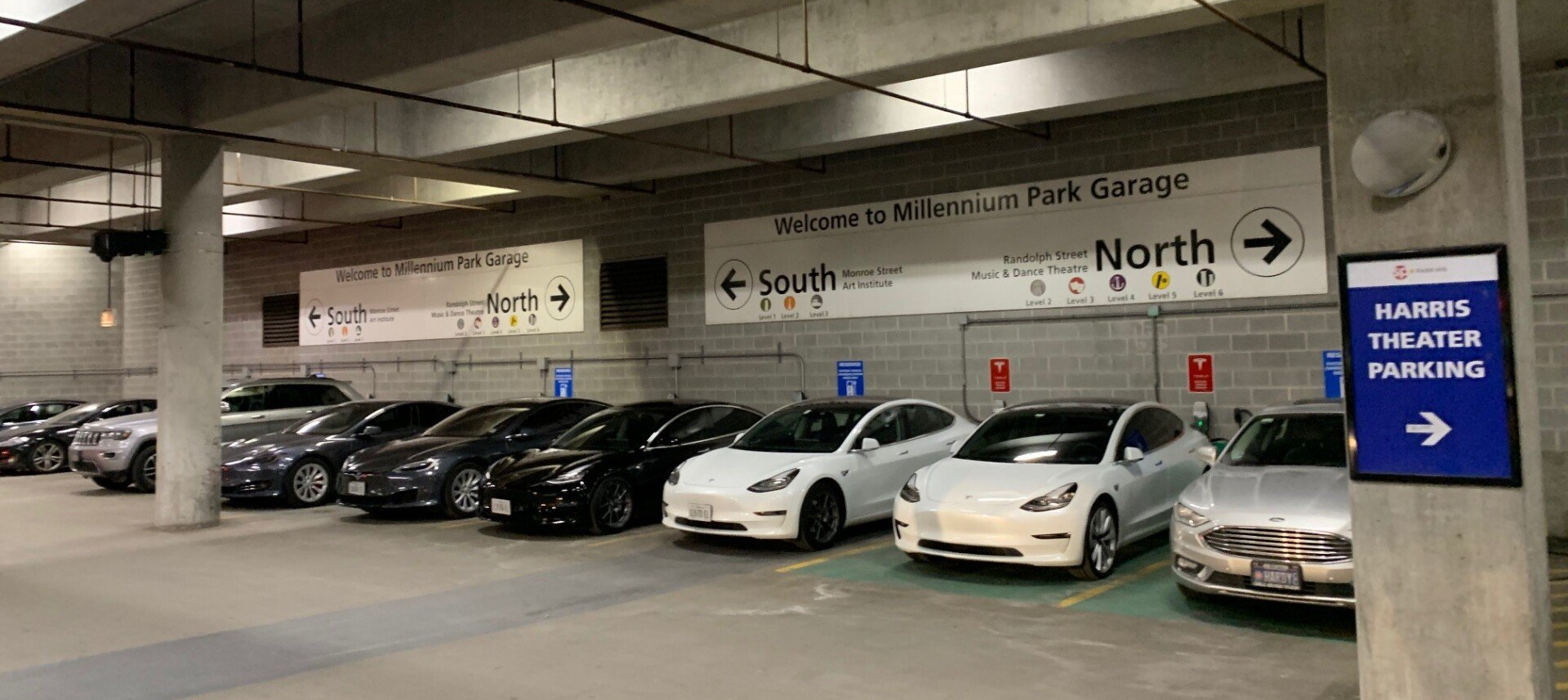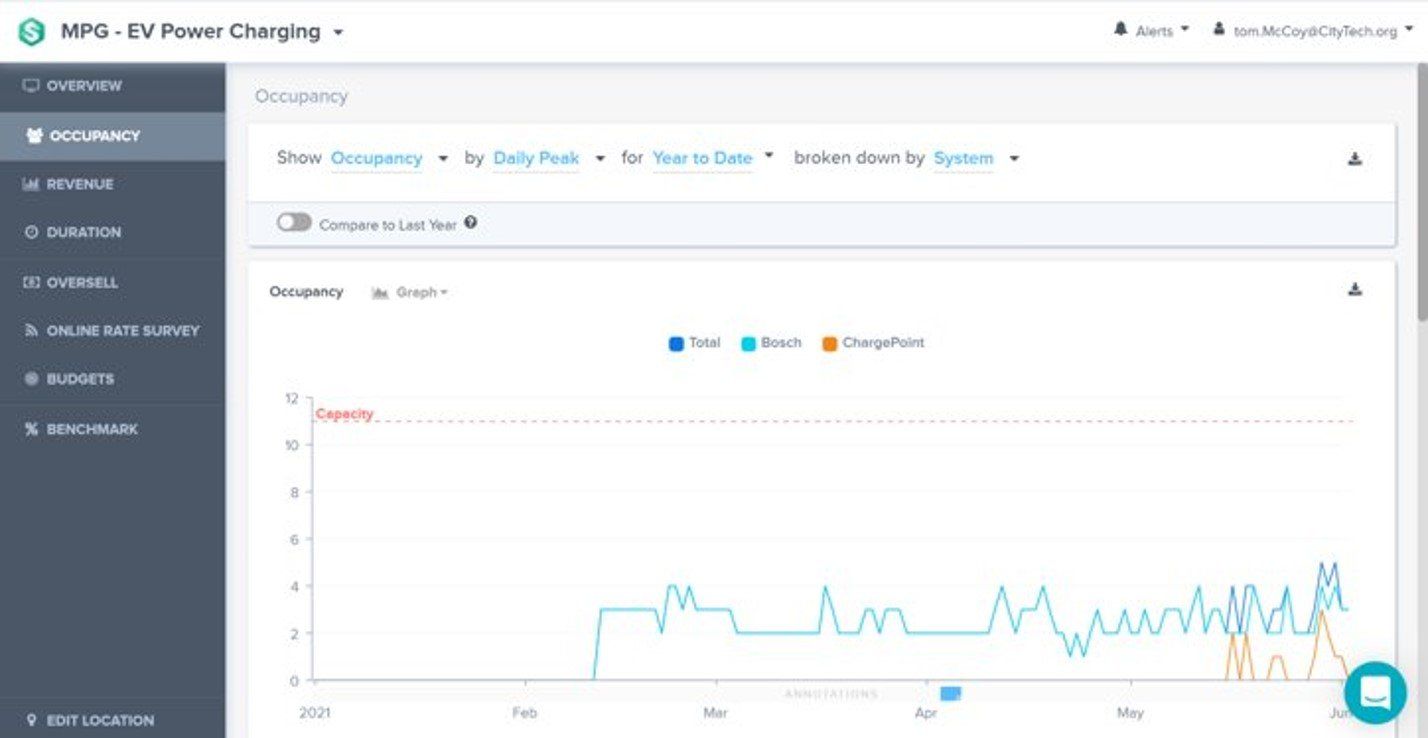Preparing for EV Growth: City Tech and Partners Expand EV Charging Data for Asset Managers
To address the opportunities and challenges facing garage operators, City Tech Collaborative (City Tech) collaborated with testbed host Millennium Garages, sensor manufacturer and Tier 1 automotive supplier Bosch USA, parking business intelligence provider Smarking, and EV charging equipment and service provider ChargePoint to build a connected, real-time occupancy monitoring system to improve EV charging space management and related operations.
As part of the Millennium Garages pilot, Bosch installed sensors on ten EV charging spots to determine space occupancy, duration, and whether / how long vehicles charged while parked. Smarking was able to then compile this data into a single dashboard and to help facilities operators to visualize, analyze, and understand real-time use of their chargers. By providing a consolidated view of charging activity across multiple chargers and equipment providers for the first time, this approach can take the guesswork out of operational decisions.
For Millennium Garages, the largest underground parking garage in the US spanning 3.8 million square feet beneath downtown Chicago, these insights can inform EV pricing, if/when to expand the number of EV parking spaces, and the return on investment for the current EV spaces. These insights are critical whether a facility has three EV spaces or 300.
Just three months since the project began, new EV charging analytics are already producing valuable insights that can guide future facility operations and investments. The Smarking dashboard revealed that there were customers charging overnight each night; the team hypothesized that the customers were using the stations to refill after a commute outside of the downtown area – a newly discovered usage pattern. With this new customer segment identified, there are opportunities to explore the market and rethink business models, customer acquisition strategies and pricing models. By identifying shared goals and aligning incentives across pilot partners, this project drove rapid integration and testing of industry-leading capabilities and revealed insights that may have been otherwise overlooked.
The approach and technology from this solution can be applied in several ways going forward. In addition to informing garage operations, this will help with sizing of charging infrastructure, facilitate capital planning, and identify additional opportunities (such as large-scale onsite energy storage) to enable expanded electrification of fleets and larger vehicles, while also incorporating related considerations and benefits (such as local electric grid stability, peak shaving, and demand response). Eventually, newly created occupancy data could be made visible to customers, parking search engines, and EV reservation systems.
Over the coming months, garage operators and other asset managers who are looking to expand EV capabilities can build a foundation for improved operational decisions in the future. Those who do will be able to respond nimbly to new information as EV usage grows. Those who don’t may be left with drivers passing them by.
About the Author: Tom McCoy manages the Solution Development process for City Tech. In this role, Tom oversees the development and management of pilot projects, including team formation, scoping, legal negotiation, execution, and evaluation/scaling. Tom has 10 years of experience leading teams to deliver innovative technology solutions in the Pharma, Retail and Consumer Technology industries. Most recently, Tom led a product development team at Nextdoor focused on helping locally owned businesses compete by strengthening their connections to their neighborhoods and local customers. Tom has a bachelor's degree in Industrial Engineering from the University of Wisconsin.
About City Tech Collaborative (City Tech): City Tech is an urban solutions accelerator that tackles problems too big for any single sector or organization to solve alone. City Tech’s work uses IoT sensing networks, advanced analytics, and urban design to create scalable, market ready solutions. Current initiatives address advanced mobility, healthy cities, connected infrastructure, and emerging growth opportunities. City Tech was born and raised in Chicago, and every city is a potential partner. Visit www.CityTech.org and follow us on Twitter and LinkedIn.


